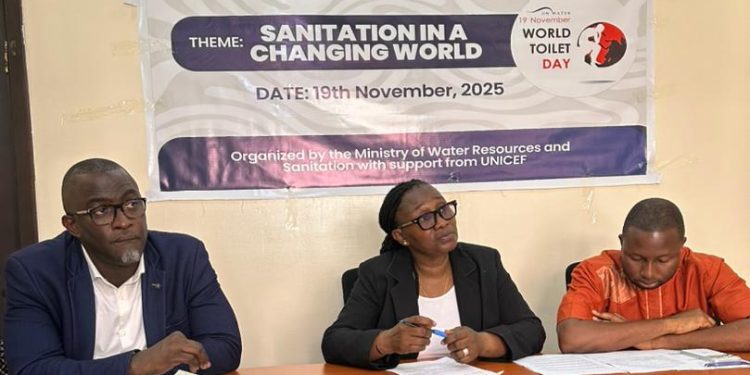By Hassan Osman Kargbo
The Ministry of Water Resources and Sanitation has reaffirmed its commitment to achieving an open defecation-free Sierra Leone as it commemorated World Toilet Day 2025 under the theme “Sanitation in a Changing World.” The national event will be held in Moyamba and it will bring together government officials, development partners, and community representatives to highlight the country’s progress and remaining challenges in improving sanitation nationwide.
In a press conference held at the ministry’s headquarters on Tuesday 17 November 2025, the Minister of Water Resources and Sanitation, Dr. Sao Kpato Hannah Isatta Macarthy, emphasized that Sierra Leone is steadily advancing in its open defecation-free campaign, with several chiefdoms already verified and declared compliant. She noted that the process is gradual but strategic.
“Our goal is to ensure that by the end of the implementation of the national strategic plan, Sierra Leone will be an open defecation-free country,” the minister said. “It is a whole process, but we are moving gradually. This work reflects our commitment to sanitation, dignity, and public health.”
Explaining why Moyamba was chosen to host this year’s national commemoration, Dr. Macarthy said the ministry is decentralizing major national activities to ensure wider participation beyond Freetown.
“This is a national program. We don’t want it to be restricted to Freetown,” she said. “We have hosted similar celebrations in various locations across the country. Moyamba was selected this year because several of its chiefdoms are about to be declared open defecation-free. Decentralization is important because the majority of our population lives outside the capital.”
Addressing one of the toughest challenges, sanitation in slum communities—the minister explained that the ministry is working closely with the Freetown City Council and multiple NGO partners to ensure that vulnerable communities are not left behind. She noted that many slums face difficult terrains, particularly near coastlines, where constructing safe toilets is complicated by rising water tables and space constraints.
“It can be extremely challenging to build proper sanitation facilities in these areas,” she said. “That is why the government has made several attempts to relocate residents to safer locations. But while they remain there, we continue to provide makeshift solutions, education on hygiene, and guidance on safe waste disposal.”
Dr. Macarthy also stressed the importance of increasing public toilets in underserved communities. She recommended the construction of more accessible public sanitation facilities, noting that reliance on privately owned toilets is not sustainable.
“A single toilet serving many people poses health risks,” she said. “We work with NGOs and councils to build additional toilets and put systems in place where communities can contribute small amounts to support maintenance. Access is key, and our new urban project will deliver several toilets across Western Urban and Western Rural.” She said.
Permanent Secretary of the Ministry, Mr. Allieu Bakarr Conteh, reinforced the minister’s message, noting that the sanitation drive is not limited to the 26 chiefdoms already declared open defecation-free. He emphasized that the ministry’s work is continuous and nationwide.
“Our responsibility goes beyond declarations,” he said. “We are ensuring that sanitation services reach every community, no matter how remote or underserved.”
The World Toilet Day commemoration concluded with renewed commitments from government and partners to strengthen sanitation systems, improve community hygiene, and adapt to the changing environmental and urban realities facing Sierra Leone.











